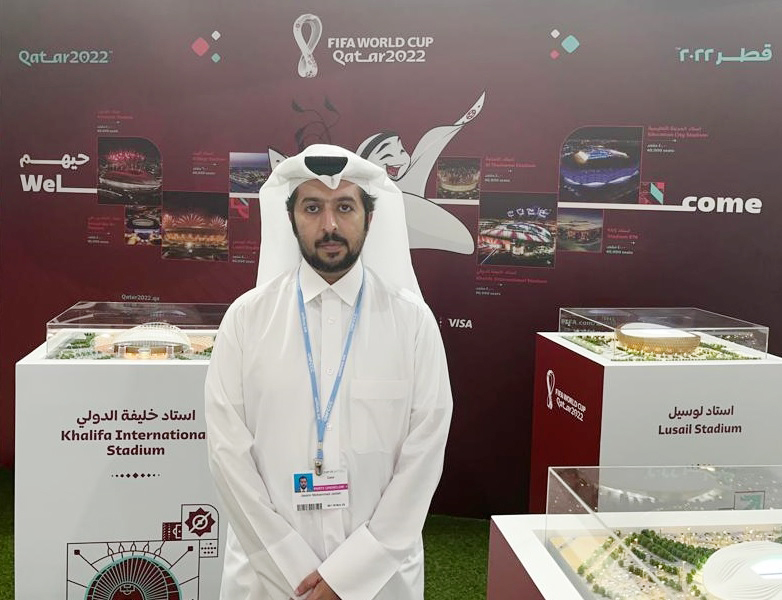Sharm El Sheikh – Qatar is ready to deliver an exceptional and unique edition of the World Cup. The sustainability communications manager of the Supreme Committee for Delivery & Legacy of the Qatar FIFA World Cup, Jassim Al Jaidah (pictured above), made the statement to ANBA on the sidelines of the United Nations Conference on Climate Change (UNFCCC COP27), taking place in Sharm El Sheikh, Egypt. He reported on the initiatives the Arab country implemented to ensure a sustainable World Cup.
He said when Qatar won the bid to host the International Football Federation (FIFA) 2022 World Cup, it was committed to having the most sustainable edition in the competition’s history. According to Al Jaidah, Qatar pledged to employ sustainability and protection of the environment in all stages of the infrastructure projects needed to host the games, including the eight stadiums for the Cup.
The director said all stadiums obtained GSAS (Global Sustainability Assessment System) certification. The certification consists of an integrated system for evaluating green buildings and infrastructure works and their environmental impacts. The goal is to promote sustainable practices in the different stages of building, from design, through construction, to the operational phase, identifying the challenges associated with sustainability in the works and considering the impact on the local environment. The use of GSAS has already occurred in previous cups.
Al Jaidah said the World Cup stadiums were awarded the five-star category in design and construction and received the A rating in the management of building works. The stadiums obtained energy efficiency certificates, as clean energy was considered at the design stage, which meant they consumed up to 40% less energy than other stadiums worldwide. A unique LED lighting technology was also used, which has greater durability and lower power consumption.
The director also said the water used to irrigate the lawns is recycled and treated, and recycled materials were used to construct the stadiums. In the case of the Ahmed Bin Ali Stadium, reused materials reached 90% of the total utilized in the construction work, according to Al Jaidah.
Sustainability strategy
Al Jaidah said Qatar is the first World Cup host country to sign a cooperation agreement with FIFA on sustainability. According to him, in previous editions, FIFA developed a sustainability plan to be implemented by the host countries. However, for this edition, FIFA has created an action plan specifically based on Qatar’s needs in the environmental area. This is due, in large part, to the interest of the Supreme Committee for Delivery & Legacy in making the current edition of the tournament the most sustainable ever, in addition to aiming at the benefit of future generations, according to the director.
He explained the strategy adopted by Qatar in terms of sustainability was based on five main axes: Economic, environmental, humanitarian, social, and governmental. Al Jaidah said previous editions were based on only three axes: Environmental, economic, and social. He gave the example of Stadium 974, the first of its kind in the world, built from shipping containers and which can be dismantled and installed anywhere else, becoming a model of sustainability.
Similar is the case of the Ahmed Bin Ali Stadium, formerly known as the Al Rayyan Club stadium, which was completely demolished to be built with materials from the demolition. There is also the case of the Al Bayt Stadium, scheduled to host the opening match of the World Cup. Its initial design was conceived to have a black façade, but, to ensure sustainability and not absorb heat, the façade was changed to white.
“All means of transport aim to reduce carbon emissions, notably the metro, buses, and electric cars. In addition, the FIFA World Cup Qatar 2022 edition is the first to not rely on planes for domestic travel between cities and stadiums due to the small size of the country and the closeness of stadiums to each other,” he said.
Waste management
Regarding opportunities to use the World Cup to spread the culture of environmental preservation, he said the Supreme Committee for Delivery & Legacy had promoted the dissemination of sustainability awareness in many regions of Qatar. Separation containers were also allocated for selective garbage collection to encourage visitors to separate waste. The committee also recently launched the “As One Tide” program to reduce plastic waste reaching the seas and oceans.
Al Jaidah reported some sustainability actions were already implemented in the last Arab Football Cup, which was held in some of the same stadiums as the World Cup. According to him, the percentage of recycling of all waste generated in the competition reached over 70%.
Translated by Georgette Merkhan & Elúsio Brasileiro




